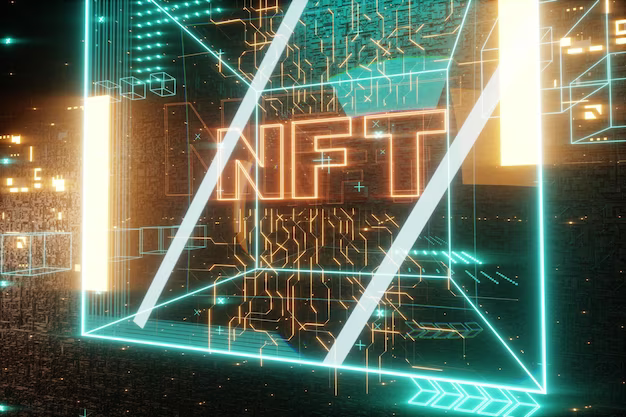Tech
Unveiling the Boundless Potential of NFTs: A Glimpse into 2024 & Beyond

In recent years, blockchain technology has captivated the global stage, with its non-fungible tokens (NFTs) emerging as a unique and transformative asset class. As we delve into the future of NFT use cases for businesses, brands, and startups in 2024, it’s essential to understand the fundamental concept of NFTs and their unparalleled advantages.
NFT Overview
Non-fungible tokens, or NFTs, are digital representations of one-of-a-kind assets, distinct from traditional cryptocurrencies. Since their inception in mid-2017, NFTs have experienced a resurgence in popularity, finding applications in various domains such as digital art, gaming, banking, and financial services.
The versatility of NFTs extends far beyond traditional boundaries, allowing businesses to explore innovative avenues. From music and photos to virtual real estate and entire virtual worlds, NFTs offer a novel instrument for storytelling, customer engagement, and creating unique selling propositions. The transparent and traceable nature of blockchain ensures that the entire history of nft token development company ownership is securely recorded.
Benefits of NFTs for Businesses
High Security
NFTs provide enhanced security for storing business-sensitive data, preventing data duplication and tampering. Their robust encryption capabilities go beyond core blockchain features, eliminating the risk of data fabrication or unauthorized exchanges.
Identity Theft Prevention
NFTs play a crucial role in protecting online identities, allowing individuals to verify their documents online without compromising legitimacy. Professionals can showcase and validate their NFTs in real time, offering a secure means of identity verification.
Transferability
NFTs facilitate easy and secure trading on various markets, enabling game developers to create in-game objects with ownership transfer capabilities. Smart contracts streamline the transfer process by setting specific requirements between buyers and sellers.
Brand Recognition and Loyalty
Businesses can strengthen brand recognition and loyalty by leveraging NFTs to engage customers. The uniqueness of NFT-based offerings adds a personalized touch to the consumer experience, fostering interest in products.
NFT Use Cases in Various Industries
NFT & Digital Arts
NFTs revolutionize the art world by providing proof of ownership for digital art pieces. Artists, inspired by success stories like Beeple, can explore NFT marketplaces to showcase and sell their unique creations.
NFT in the Gaming Industry
The gaming industry embraces NFTs to address internal challenges, creating non-duplicable in-game goods. Players gain ownership of virtual assets, leading to new possibilities such as transferring profits between games or exchanging them for cryptocurrencies.
NFT in the Real Estate Industry
NFTs extend to the real estate sector, where physical properties can be represented on the blockchain. This ensures the secure and tamper-proof documentation of landholdings, providing a transparent and immutable record.
NFT in the Fashion Industry
Luxury brands enter the NFT market, combining high fashion with blockchain technology. Physical apparel and accessories are accompanied by their digital counterparts in the form of NFTs, creating a new line of digital clothing.
NFT in Virtual Reality
Virtual reality games like Decentraland leverage NFTs to specify ownership rights for virtual land parcels. Users have control over the virtual environment, buying, selling, or renting land with values influenced by proximity to famous locations.
NFT in Music
Musicians use NFTs to link their audio pieces, providing a collectible and unique form of digital music. NFTs in music address issues related to royalties and dependence on third-party services, empowering artists with direct control.
NFT in Logistics
NFTs prove valuable in the logistics industry, ensuring the security and transparency of supply chain data. From tracking perishable goods to maintaining privacy, NFTs play a pivotal role in optimizing logistics operations.
The Future of NFT
As we explore these diverse NFT use cases, it’s evident that the future holds boundless possibilities. Video games, streaming services, and other industries have only scratched the surface of what NFTs can achieve. The future of NFT lies in the hands of innovators who can harness the technology to develop practical applications that redefine how we interact with digital assets.
Conclusion
Non-fungible tokens (NFTs) represent a paradigm shift in our perception and utilization of digital assets within the blockchain marketplace. The upcoming years are expected to be characterized by sustained growth and exploration of NFT use cases, fundamentally altering how businesses, brands, and startups connect with their audiences and elevate their offerings to unparalleled levels.
As we enter 2024, the potential for NFT innovation is intricately tied to the transformative capabilities of blockchain technology, serving as the foundational infrastructure for these unique tokens. The expansive possibilities within this evolving landscape highlight the importance of businesses and innovators actively engaging with and pushing the boundaries of blockchain technology to unlock new opportunities and redefine the marketplace dynamics.
Read Also: A Glimpse Into The Influence And Impact Of Gamification In Mobile Apps

You must be logged in to post a comment Login